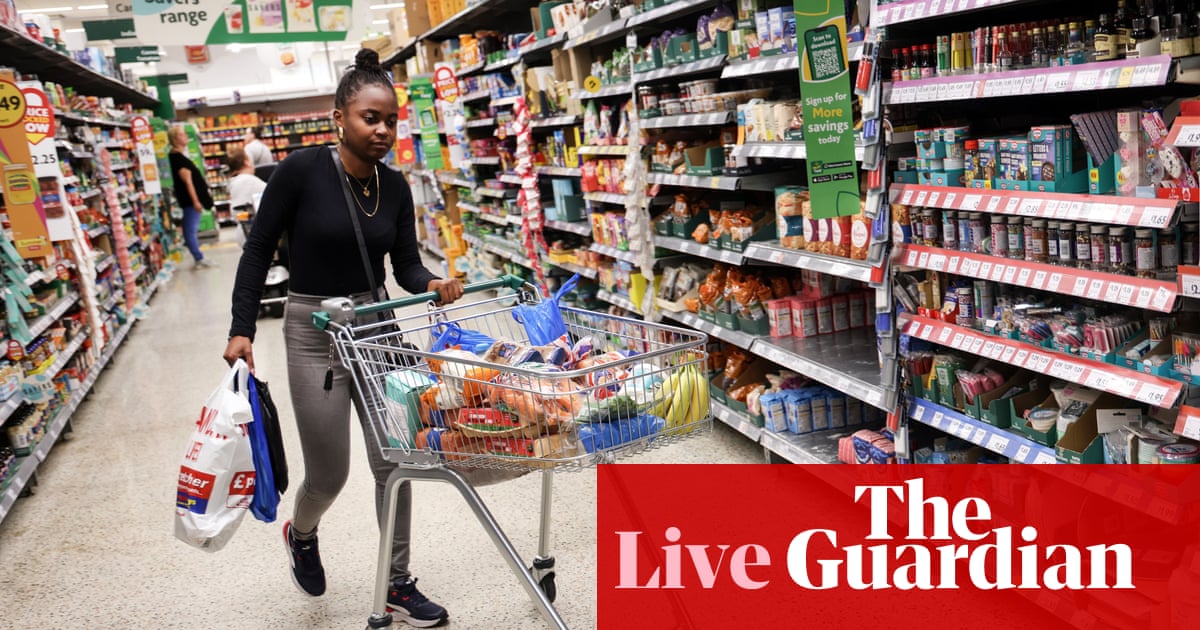
Budget 2021: Rishi Sunak to pledge more government firepower to save jobs and businesses
And finally, here’s our economics editor Larry Elliott on Wednesday’s Budget:
Rishi Sunak will use tomorrow’s budget to signal that the government’s unprecedented and continuing support for jobs and businesses must end once the economy has emerged from the Covid-19 pandemic.
The chancellor will pledge to use all the tax and spending firepower at the government’s disposal to limit joblessness and business failures as the UK gradually lifts the restrictions that have left the economy almost 10% smaller than it was a year ago.
But Sunak is also expected to announce that the period of doing “whatever it takes” will be relatively short lived and that action will be needed to repair the public finances once the crisis is over and recovery is underway.
In a budget delayed from late last year due to the pandemic, Sunak will say: “We’re using the full measure of our fiscal firepower to protect the jobs and livelihoods of the British people.”
He is expected to extend the furlough scheme, the business rates and stamp duty holidays, and maintain the £20 a week uplift in universal credit for six months.
But the chancellor will say that even the relatively rapid recovery in the economy expected by the independent Office for Budget Responsibility won’t be enough to repair all the damage to the public finances caused by the biggest one-year fall in output for more than three centuries.
Business groups are braced for the announcement that corporation tax will be raised from its current rate of 19%.
Renishaw shares surge as octogenarian founders seek buyer
Shares in UK engineering group Renishaw surged to a record high, after the group’s two founders and main shareholders put the company up for sale.
Shares closed almost 19% higher, the biggest riser in the FTSE 250 index, valuing the company at around £5bn.
The jump came after executive chairman Sir David McMurtry and his non-executive deputy John Deer, said they wanted to sell their majority stake in a firm they founded almost 50 years ago.
The founders, who are not in discussions with a potential buyer, also say they want to find “the right new owner” for the business, who will respect its culture and heritage and stay committed to the local community in their Cotswolds base.
The Evening Standard has a nice take:
Renishaw, the engineer regarded as a throw-back to a golden age of British manufacturing, was today put up for sale by its two octogenarian founders.
Sir David McMurtry, the executive chairman of and John Deer, the deputy chairman, said: “We are both grateful for our continued good health, however we recognise that neither of us is getting any younger. Now finding ourselves in our 80s, our thoughts have increasingly turned to considering the future of our shareholdings in the Company.”
The pair founded the firm in 1973 in Gloucester’s Wotton-under-Edge, once described as like something out of a PG Wodehouse novel. They had met at Rolls Royce.
Renishaw was famed for eschewing City orthodoxy, keeping debts low and ignoring the notion that British industry could not compete with China.
Among many products, it makes measuring probes, magnetic encoders and robots for brain surgery.
More here: 80 year old billionaires put Renishaw up for sale
FTSE 100 close
After a late dip, the FTSE 100 index has closed 25 points higher at 6613 points, a gain of almost 0.4% today.
Pershing Square Holdings, which tracks Bill Ackman’s hedge fund, was the top riser, up 3.7%.
Mining stocks and financial stocks also rallied, as traders continue to shake off the anxiety that sent stocks sliding last Friday.
European markets also ended higher, with Germany’s DAX up 0.2% and France’s CAC gaining 0.3%.
David Madden of CMC Markets sums up the day:
Even though stocks had a soft start to the session, the mood improved throughout the day and they are now showing respectable gains. The relativity subdued moves in government bond yields have emboldened traders to buy into stocks – so it is a similar situation to yesterday.
Last week, dealers were a little fearful on account of the upward moves in bond yields, in particular, the US-10 year yield, as it hit a one year high, but as the stability has returned to the bond market, that prompted the buying of equities. The FTSE 100 is clawing back the losses it incurred last week, while the DAX 30 hit a level last seen before the recent sell off. Rio Tinto, BHP Group and Anglo American are showing solid gains in terms of index points in the FTSE 100, higher copper prices are underpinning the rally in mining stocks.
The US dollar is dipping back too, sending the pound back to $1.396 - up a third of a cent today (sterling was down half a cent this morning)
Wall Street has slipped a little lower, with the Nasdaq now off 0.6% and the Dow slightly in the red.
UK house price rally continue: What the experts say
The 0.7% jump in UK house prices last month (according to Nationwide) suggests that some buyers hope the stamp duty holiday to be extended in tomorrow’s budget... and that others were pressing on regardless.
Nicky Stevenson, Managing Director at national estate agent group Fine & Country, says pressure for larger homes is driving the market:
“Record high agreed sale prices are a sign that the market is still being buffeted by the unshakeable desire of many to move to larger, more spacious and more expensive homes. For these buyers, the prospect of losing out on the maximum £15,000 stamp duty tax break just isn’t so important and these properties will continue to skew the overall picture for at least the next couple of months due to their price tag.
“Even those who were partly relying on the tax giveaway to stretch their offer in February couldn’t have failed to notice that the usual rounds of pre-Budget briefings by insiders were pointing increasingly to an extension of the scheme.
“Demand is still exceptionally strong and that has been reinforced already this week by Bank of England data that showed approvals for house purchase in January were still far outstripping the pre-pandemic average. This is a key indicator for future mortgage lending and transaction levels.”
Ashley Mitchell, team leader for real estate at law firm, Gowling WLG, suggests that some buyers will be anticipating an end to the Covid-19 lockdown:
“Confidence in the housing market may be under pressure but this is clear evidence of the market’s flexibility where shifting to suit behavioural changes is concerned.
The imminent end of lockdown also plays a part in helping to overshadow concerns about stamp duty, despite any extension still being in the balance.”
Mike Scott, chief analyst at estate agency Yopa, points out that housing supply remains low, propping up prices.
“Both the impending end of the stamp duty holiday and the pandemic-induced levels of unemployment and under-employment would be expected to hit house prices, but prices are currently being supported by strong demand and low supply. Many new-build projects were delayed last year, which is hitting the supply of new homes. And many people are now looking towards a different lifestyle after the pandemic, in a different home.
On Wednesday, the Chancellor is expected to extend the stamp duty holiday, at least for purchases that are already in progress, and to introduce new measures to encourage lenders to offer first-time buyer mortgages of up to 95% of the purchase price.
Both of these steps will further support demand, and thus we expect to see prices continue to rise in the immediate future.”
Jillian Ambrose
National Grid will lead an industry rebellion against the energy regulator by taking Ofgem’s plan to cut energy network company earnings to the competition watchdog.
The company said it would refer parts of Ofgem’s new regulatory plan to the Competition and Markets Authority (CMA) because it does not allow large enough returns for its investment in the UK’s gas pipes and electricity wires.
Back in the UK, MPs have been hearing about the challenges of trading seafood with the EU under the Brexit deal.
Adam Payne of Politics Home has the details from the Environment, Food and Rural Affairs Committee hearing:
In New York, stocks are dipping back in early trading.
The S&P 500 index of US stocks has lost 7.6 points, or 0.2%, to 3,894, after surging 2.4% yesterday in its strongest rally since last June.
The tech-focused Nasdaq index is a little softer too, down 51 points or almost 0.4% at 13,537, while the Dow is flat.
Canadian economy shrank 5.4% last year amid pandemic
Just in: Canada’s economy has suffered its worst year in at least six decades.
Canadian real GDP shrank 5.4% in 2020, new data shows, in a reminder of the economic damage caused by the Covid-19 pandemic.
That’s the steepest annual decline since quarterly data were first recorded in 1961, according to Statistics Canada.
Statistics Canada also reports that the economy slowed in the final quarter of 2020, but kept growing, with GDP rising by 2.3% quarter-on-quarter.
That’s down on the 8.9% growth recorded in July-September, when the global economy was bouncing back from the first wave of Covid-19.
In December alone, growth slowed to just 0.1%, following an 0.8% rise in November.
Statistics Canada says:
This eighth consecutive monthly increase continued to offset the steepest drops on record in Canadian economic activity in March and April. Nevertheless, total economic activity was about 3% below February’s pre-pandemic level.
Encouragingly, Statistics Canada also estimates that GDP rose by 0.5% in January.
Investors shake off bubble warning...
European investors seem to be shaking off China’s warning about dangerous bubbles in the financial markets.
The UK’s FTSE 100 has now gained 0.6%, or 39 points, to 6627 points, adding to yesterday’s gains after a tumble last Friday.
The slump in German exports across/under the Channel hasn’t caused alarm in Frankfurt either, where the DAX has gained 66 points (or 0.5%) to 14,079.
Sophie Griffiths, market analyst at OANDA, says:
After a stellar session on Monday that saw the S&P enjoy its strongest day of gains in nine months, Europe opened on the defensive. Warnings over asset bubbles from Chinese officials, fresh concerns over Covid numbers and dismal German retail sales figures all briefly weighed on sentiment.
However, cautious optimism has started to seep into the markets and some European equity indices are turning higher.
Wall Street surged yesterday after US regulators approved Johnson & Johnson’s Covid-19 vaccine over the weekend. But overnight, WHO warned that the crisis probably won’t be over by the end of the year.
Griffiths adds:
Despite recent encouraging developments regarding Covid vaccine rollouts, a report from the World Health Organisation that the number of new daily infections rose last week for the first time in seven weeks is unnerving investors.
Vaccine developments and optimism surrounding the reopening of economies has driven global stock markets higher since November. However, today’s WHO report is a stark reminder that the battle has by no means been won, serving as a check on risk sentiment.
Aldi and Lidl lose out as UK online grocery sales hit new heights
Two of Germany’s discount supermarket groups have lost market share in the UK, for the first time in over a decade.
Aldi and Lidl’s share of the UK grocery market declined amid the boom in online groceries, which also lifted Tesco’s market share for the first time since 2016 (from 27.2% to 27.4%).
Aldi had 7.5% of the market in the 12 weeks to 21st February, compared to 7.9% a year earlier while Lidl’s share has dipped to 5.7% from 5.8%.
My colleague Sarah Butler explains:
Online grocery sales accounted for a record 15.4% share of the market in the four weeks to 21 February, up from 8.7% last year, as all the big supermarkets increased their provision for deliveries according to market analysts Kantar.
Fraser McKevitt, head of retail at Kantar, said:
“Nearly a quarter of households bought groceries online during the past month, making the most of home deliveries especially to get hold of bulkier goods like canned foods, breakfast cereals and soft drinks. It’s been an extraordinary 12 months for online.”
He said 3m tonnes of food had been delivered to people’s homes over the past year and the habit seemed to be sticking, with those who bought online happier about the service they received than those who shopped in stores.
The switch to home deliveries, and a desire to shop either in a big supermarket that can supply everything, or a handy small local store, led to a change in fortune for Lidl, which does not sell online, for the first time since 2010. Its fellow German discounter Aldi, which only sells alcohol and some non-food items online, has been losing market share since May 2020, but last month was the first time in decade that both lost out.
And here’s Bloomberg’s take:
German exports to Britain plunged in January, as the downward trend since the country voted to leave the European Union gathered pace.
Already curtailed by the economic impact of the coronavirus, Brexit helped trigger a nearly 30% slump in German exports to the U.K. in the first month of the year, according to a preliminary estimate published Tuesday by the Federal Statistics Office.
That was nearly double the 15.5% decline in 2020, which was the biggest annual drop since the financial crisis in 2009, according to the agency.
Here’s Reuters’ take on the slide in German exports to the UK:
German exports to the United Kingdom fell by 30% on the year in January as the impact of Brexit turned Europe’s largest economy away from the UK, exacerbating the hit to business from the coronavirus pandemic, official figures showed on Tuesday.
The UK left the European Union’s orbit at the end of last year, turning its back on a tempestuous 48-year liaison with the European project for an uncertain post-Brexit future in its most significant geopolitical shift since the loss of empire.
The formal split ended the UK’s transition period out of the bloc - de facto membership - and raised barriers to trade, though German businesses had already begun reducing business with Britain.
German exports to UK tumble 30% in January
German exports to the UK tumbled by almost a third in January, as “Brexit effects” hit trade between the two countries, official data from Germany shows.
Provisional data from the Federal Statistical Office (online here) show that German exports to the UK fell by roughly 30% in January, compared with January 2020.
It says:
According to first provisional data on German exports to the United Kingdom, the January 2021 figures are expected to show a significant decline compared with the same month a year earlier. The Federal Statistical Office (Destatis) also reports that German exports decreased by roughly 30% compared with January 2020, according to provisional calculations.
Based on an extrapolation, exports to the United Kingdom continued to decline in January 2021 due to Brexit effects, after the year 2020 was characterised by the coronavirus pandemic.
Destatis also reports that German exports to the United Kingdom fell by 15.5% in 2020, compared to 2019. That’s the highest year-on-year decline since 2009, after the financial crisis triggered a global downturn.
Destatis explains:
In 2020, German exports fell to €66.9bn. Since 2016 - the year of the Brexit referendum - German exports to the United Kingdom have steadily declined. In 2015, the year before the referendum, German exports amounted to €89.bn.
Imports from the United Kingdom to Germany fell by 9.6% in 2020, Destatis adds, to €34.7bn.
Again, that’s the biggest decline since 2009 -- and the fall accelerated in the second half of 2020. Destatis says:
While imports from the United Kingdom only declined slightly by 2.5% in the first half of 2020, German imports from there fell sharply in the second half of the year (-16.2%).
Last month, Destatis reported that German trade with the rest of the world suffered its biggest fall since the financial crisis in 2020, with total exports and imports slumping by 9.3% and 7.1% respectively.
There was heavy disruption at UK ports in the run-up to the end of the Brexit withdrawal agreement, as companies tried to stockpile goods in case of no-deal disruption.
Since the deal was agreed, many UK companies have reported problems with post-Brexit border checks and paperwork, and higher costs.
Data from Transporeon, an EU logistics data platform, has suggested that road freight between Britain and the EU fell by around 38% in the third week of January, year-on-year.
And last month, the Road Haulage Association reported a dramatic drop in freight travelling on ferries to the EU and through the Channel tunnel, with traffic volumes slumping by 68% in January.
Volvo to go all-electric by 2030
In the auto world, Volvo has announced plans to sell only electric cars by 2030.
It’s the latest move by a legacy carmaker to abandon fossil fuels that contribute to global heating.
The Swedish carmaker also said it would only sell its electric cars direct to consumers online, in a blow to the traditional model of selling vehicles via independent dealerships.
Volvo had previously said it wanted half of its sales to be electric by 2025, but said on Tuesday its new strategy – which puts it in line with the UK’s 2030 ban on internal combustion engine sales – was an “acceleration” of plans to phase out internal combustion engine sales completely.
Eurozone inflation steady amid lockdowns
Inflation across the eurozone remained steady last month, new figures show.
Statistics body Eurostat reports that annual inflation is expected to be 0.9% in February, matching January’s reading.
Core inflation (which strips out volatile factors) actually dipped to 1.1%, from 1.4% in January.
That suggests that the ongoing lockdowns are dampening consumer price pressures (although the longer-term question is whether inflation jumps once the lockdowns are eased).
Eurostat adds:
Looking at the main components of euro area inflation, food, alcohol & tobacco is expected to have the highest annual rate in February (1.4%, compared with 1.5% in January), followed by services (1.2%, compared with 1.4% in January), non-energy industrial goods (1.0%, compared with 1.5% in January) and energy (-1.7%, compared with -4.2% in January).
German unemployment rises unexpectedly
German joblessness unexpectedly rose for the first time in eight months in February, in another sign that the ongoing Covid-19 lockdown is hurting its economy.
The number of people out of work rose by 9,000 in February, on a seasonally-adjusted basis, to 2.75 million, leaving the unemployment rate at 6%.
Economists surveyed by Bloomberg had expected a fall of around 10k.
Reuters has more details:
“Kurzarbeit (shortened working hours) continues to secure employment on a large scale and prevent unemployment,” Labour Office chief Detlef Scheele said in a statement, adding: “Individual sectors are feeling the effects of the lockdown.”
Germany has been in lockdown since November, and measures were tightened in mid-December, as it battles a second wave of the virus. Chancellor Angela Merkel has said new variants of COVID-19 risk a third wave of infections.
Carsten Brzeski of ING reckons the harsh winter weather in February pushed up unemployment.
But, he’s also concerned that Germany’s service sector has been damaged by the ongoing restrictions:
According to the German labour agency, new applications for short-time work schemes dropped somewhat in February to 500,000. This is based on estimates and actual data is only available until December 2020. Here, the total number of people in short-time work had increased to 2.39 million, from 2.38m in November and 2.01m in October. In April, it stood at almost 6 million.
Looking ahead, the labour market could mirror the ongoing divergence between the manufacturing and services sector. Recruitment intentions in the manufacturing sector have improved gradually since last summer but are still slightly below the historic average. In the services sector, however, recruitment plans have dropped again since the summer, reflecting the longer-term damage in this sector as well as the impact from the second and ongoing lockdown.
In sum, despite the small increase, this morning’s headline numbers suggest that the German labour market is still getting through the crisis relatively well. However, the rising number of short-time workers, as well as the longer-term impact from the ongoing second lockdown and a high risk of insolvencies in 2021, clearly argue against too much optimism.
Over in Germany, retail sales fell sharply during the lockdown in January.
Retail spending dropped by 4.5% month-on-month, and was 8.7% lower than a year ago.
Statistics body Destatis says:
These results can be explained by the second COVID-19 lockdown, which led to a partial retail closure starting on 16 December 2020.
The drop is rather larger than expected, highlighting the impact of the current restrictions (although these retail sales figures are pretty volatile...).












